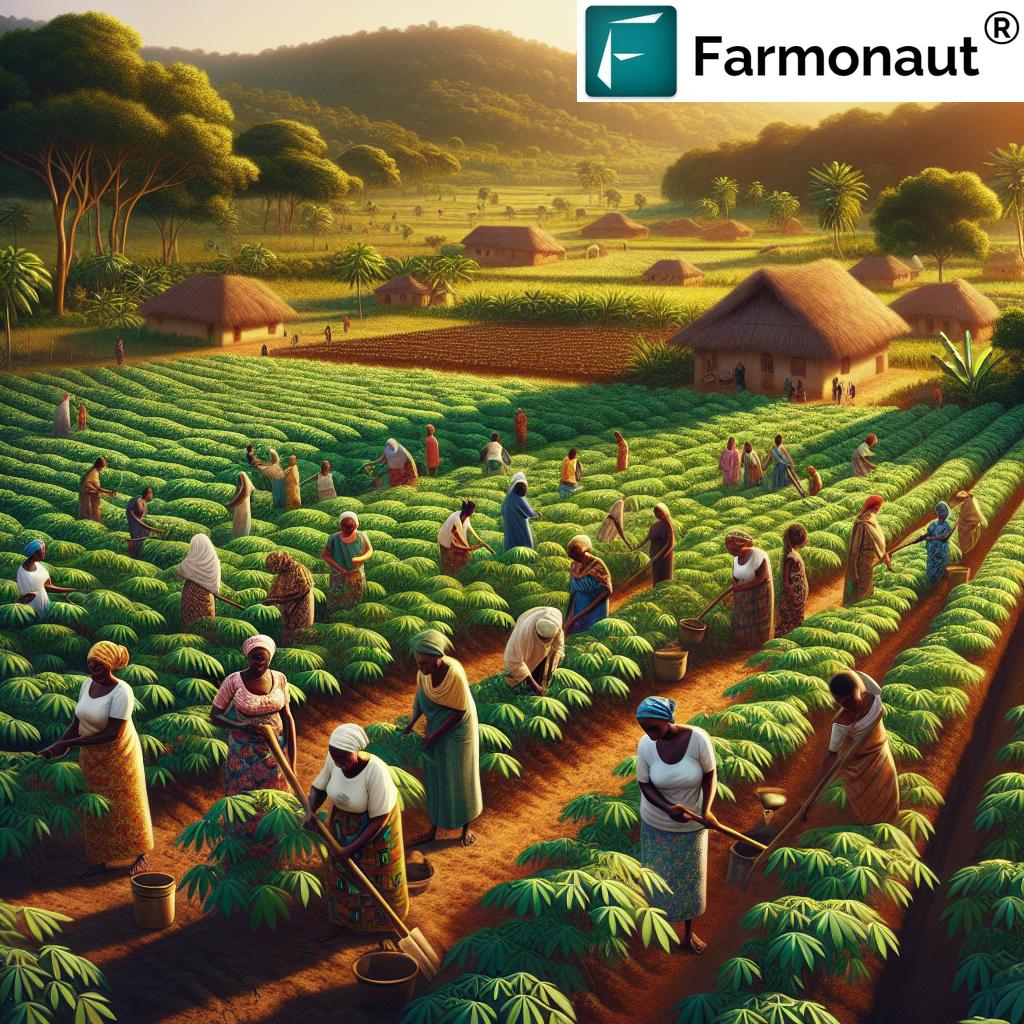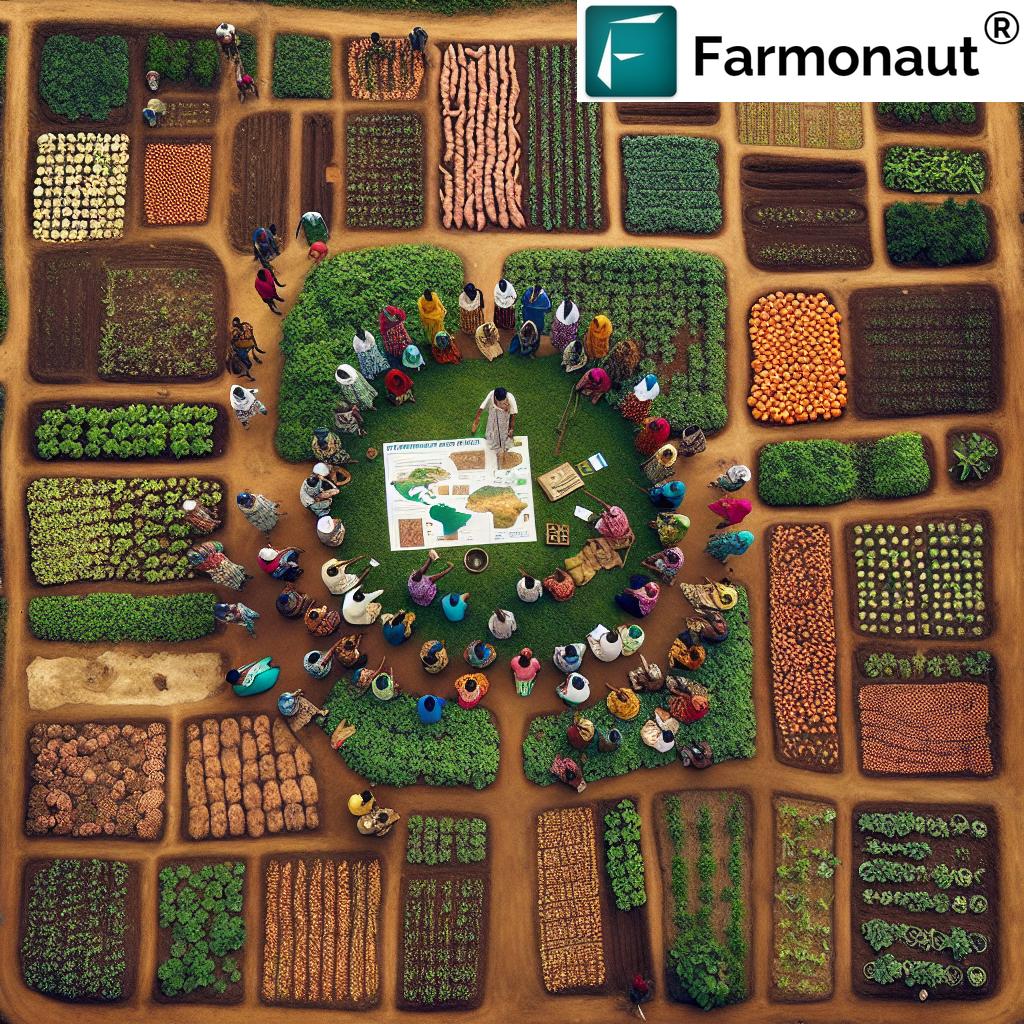Empowering Liberian Women Farmers: Overcoming Land Rights Challenges for Sustainable Agriculture
“In Liberia, women make up 80% of the agricultural labor force and contribute to 93% of food production.”
In the heart of West Africa, Liberia’s agricultural landscape is facing a critical juncture. As we delve into the complexities of sustainable farming practices and land rights for farmers in this nation, we uncover a narrative that is both challenging and inspiring. The story of Liberian women farmers, who form the backbone of the country’s agricultural sector, is one of resilience, struggle, and the urgent need for change.

In this comprehensive exploration, we will examine the rural agricultural challenges encountered by female farmers in Liberia, who constitute an astounding 80% of the agricultural labor force and contribute to 93% of food production. Despite these impressive statistics, women farmers face significant hurdles, particularly in accessing and controlling land.
The Plight of Liberian Women Farmers
To understand the gravity of the situation, let’s consider the story of Mallah Dolo, a 28-year-old single mother of two from Bong County. Dolo’s journey from a university student to a struggling farmer encapsulates the challenges faced by many Liberian women in agriculture. After being forced to drop out of Cuttington University due to financial constraints, Dolo turned to farming as her primary source of income.
For three years, Dolo has been cultivating various crops in the Agartala region, including:
- Cassava
- Sweet potatoes
- Okra
- Bitter balls
- Garden eggs
- Pepper
- Potato greens
However, her path to sustainable farming has been fraught with obstacles, the most significant being the lack of land ownership.
Land Rights: The Core of the Issue
The crux of the problem lies in the complex land rights situation in Liberia. Despite the enactment of the Land Rights Law in 2018, which was intended to secure women’s rights to land ownership, implementation remains woefully inadequate. Women farmers like Dolo are often forced into unfair leasing arrangements with town chiefs, a practice that severely limits their financial returns and ability to sustain their families.
“Despite the 2018 Land Rights Law, Liberian women farmers still struggle with land access and control.”
The impact of this land rights crisis is far-reaching:
- Economic Instability: Women farmers are required to give away half of their harvest as rent, significantly reducing their income.
- Food Insecurity: Limited access to land affects crop production, leading to reduced food availability.
- Gender Inequality: The struggle for land rights perpetuates gender disparities in rural communities.
Crop Cultivation Techniques: A Ray of Hope
Despite these challenges, Liberian women farmers like Dolo are employing various crop cultivation techniques to maximize their yields. Let’s explore some of the methods used for key crops:
Cassava Cultivation
Cassava, a staple in Liberian cuisine, is known for its resilience and versatility. Women farmers employ the following techniques:
- Intercropping: Planting cassava alongside other crops to maximize land use.
- Soil Conservation: Implementing erosion control measures to maintain soil fertility.
- Pest Management: Using natural pesticides to protect crops from common pests.
Sweet Potato Cultivation
Sweet potatoes are another crucial crop for Liberian farmers. Cultivation techniques include:
- Mound Planting: Creating raised beds to improve drainage and increase yields.
- Crop Rotation: Alternating sweet potatoes with other crops to maintain soil health.
- Organic Fertilization: Using compost and green manures to enhance soil fertility.
Vegetable Farming
Vegetables like okra, bitter balls, and garden eggs are essential for both nutrition and income. Women farmers use techniques such as:
- Companion Planting: Growing complementary plants together to deter pests and improve growth.
- Mulching: Applying organic materials to conserve soil moisture and suppress weeds.
- Vertical Gardening: Maximizing space in small plots by growing crops vertically.
While these techniques demonstrate the resourcefulness of Liberian women farmers, their effectiveness is limited by the constraints of land access and ownership. This is where technology can play a crucial role in empowering these farmers.
For instance, Farmonaut’s satellite-based farm management solutions could potentially revolutionize farming practices in Liberia. By providing real-time crop health monitoring and AI-based advisory systems, Farmonaut’s technology could help women farmers optimize their limited resources and improve crop yields.

The Importance of Farming Tools and Seeds
Access to quality farming tools and seeds is another critical factor in sustaining the livelihoods of Liberian women farmers. Organizations like ActionAid and its partner Domafeign have recognized this need and are providing support in the form of:
- Basic Farming Tools: Hoes, machetes, and watering cans
- Improved Seed Varieties: Drought-resistant and high-yielding seeds
- Training Programs: Education on modern farming techniques and sustainable practices
However, these efforts, while valuable, are not sufficient to address the root cause of the problem – the lack of secure land rights.
Climate Justice in Agriculture
The challenges faced by Liberian women farmers are further compounded by the impacts of climate change. As global temperatures rise and weather patterns become increasingly unpredictable, these farmers find themselves on the front lines of climate change, facing:
- Erratic Rainfall: Affecting planting schedules and crop yields
- Increased Pest Infestations: Due to changing climatic conditions
- Soil Degradation: Resulting from extreme weather events
Addressing climate justice in agriculture is crucial for the long-term sustainability of farming in Liberia. This involves:
- Promoting Climate-Smart Agriculture: Techniques that are resilient to climate change
- Improving Access to Climate Information: Enabling farmers to make informed decisions
- Advocating for Global Climate Action: To mitigate the impacts on vulnerable communities
The Need for Improved Governance
The situation in Liberia highlights significant discrepancies between legislation and reality, particularly for women in agriculture. While the Land Rights Law exists, its practical application remains a challenge. This underscores the urgent need for improved governance to support women farmers. Key areas for improvement include:
- Effective Implementation of Land Rights Law: Ensuring that women’s land rights are respected and enforced
- Increased Awareness and Education: Informing rural communities about land rights and legal protections
- Strengthening Legal Support Systems: Providing accessible legal aid to women farmers
- Promoting Women’s Participation in Decision-Making: Ensuring women’s voices are heard in agricultural policy-making
By addressing these governance issues, Liberia can create a more equitable environment for its women farmers, enabling them to contribute more effectively to the country’s food security and economic development.
The Role of Technology in Empowering Women Farmers
In the face of these challenges, technology emerges as a powerful tool for empowering Liberian women farmers. Advanced agricultural technologies, such as those offered by Farmonaut, have the potential to transform farming practices and improve outcomes for women farmers.
Farmonaut’s API and API Developer Docs provide access to cutting-edge satellite-based farm management solutions. These tools could be instrumental in:
- Optimizing Resource Use: By providing real-time data on crop health and soil conditions
- Improving Crop Yields: Through AI-driven insights and personalized farming advice
- Enhancing Decision-Making: By offering accurate weather forecasts and crop monitoring
While access to such technology may currently be limited in rural Liberia, its potential impact on women farmers cannot be overstated. As connectivity improves and technology becomes more accessible, tools like Farmonaut could play a crucial role in bridging the gap between traditional farming practices and modern, data-driven agriculture.
Challenges and Solutions for Liberian Women Farmers
| Challenge | Impact | Potential Solutions |
|---|---|---|
| Limited land access | Reduced crop yield (est. 30% lower) | Enforce 2018 Land Rights Law, community-based land allocation programs |
| Unfair leasing arrangements | Economic instability for women farmers | Legal support, fair contract negotiations, cooperative farming models |
| Climate change effects | Crop failures, reduced food security | Climate-resilient farming techniques, diversification of crops |
| Lack of modern farming tools | Lower productivity and efficiency | NGO partnerships for tool provision, microfinance for equipment purchase |
| Limited access to markets | Reduced income potential | Cooperative marketing initiatives, improved rural infrastructure |
The Way Forward: A Call to Action
As we reflect on the challenges faced by Liberian women farmers, it becomes clear that a multifaceted approach is necessary to address these issues. Here are some key steps that need to be taken:
- Strengthening Land Rights: Rigorous enforcement of the 2018 Land Rights Law to ensure women’s access to land.
- Improving Agricultural Education: Providing training on modern farming techniques and sustainable practices.
- Enhancing Access to Technology: Facilitating the adoption of advanced agricultural technologies like those offered by Farmonaut.
- Promoting Climate-Smart Agriculture: Implementing farming practices that are resilient to climate change.
- Empowering Women in Decision-Making: Ensuring women’s voices are heard in agricultural policy-making processes.
- Developing Fair Market Access: Creating opportunities for women farmers to sell their produce at fair prices.
By implementing these measures, we can work towards a future where Liberian women farmers are empowered, productive, and able to contribute fully to their country’s food security and economic growth.
Conclusion: A Vision for Sustainable Agriculture in Liberia
The story of Liberian women farmers is one of resilience in the face of overwhelming odds. Despite the challenges of limited land access, unfair leasing arrangements, and the impacts of climate change, these women continue to be the backbone of Liberia’s agricultural sector.
As we look to the future, it’s clear that empowering these women is not just a matter of social justice – it’s essential for the food security and economic development of Liberia as a whole. By addressing the challenges of land rights, providing access to modern farming tools and technologies, and implementing climate-smart agricultural practices, we can create a more sustainable and equitable agricultural sector in Liberia.
The journey ahead is long, but with concerted efforts from government bodies, NGOs, technology providers like Farmonaut, and the international community, we can work towards a future where Liberian women farmers are not just surviving, but thriving. It’s time to turn the tide and ensure that these vital contributors to Liberia’s agriculture receive the support and recognition they deserve.
FAQ Section
- Q: What is the main challenge faced by women farmers in Liberia?
A: The primary challenge is limited access to land ownership and control, despite women making up 80% of the agricultural labor force. - Q: How does the 2018 Land Rights Law affect women farmers in Liberia?
A: While the law was intended to secure women’s rights to land ownership, its implementation remains inadequate, leaving many women still struggling with land access. - Q: What crops are commonly grown by women farmers in Liberia?
A: Common crops include cassava, sweet potatoes, okra, bitter balls, garden eggs, pepper, and potato greens. - Q: How does climate change impact Liberian women farmers?
A: Climate change leads to erratic rainfall, increased pest infestations, and soil degradation, significantly affecting crop yields and food security. - Q: What role can technology play in supporting Liberian women farmers?
A: Advanced technologies like satellite-based farm management solutions can help optimize resource use, improve crop yields, and enhance decision-making in farming practices.
For those interested in exploring how technology can revolutionize farming practices, consider checking out Farmonaut’s offerings:






